Businesses often struggle to implement machine learning for predictive analytics due to technical barriers and a shortage of specialized talent.
Many solutions require advanced coding skills, making them inaccessible to teams without dedicated data science expertise. Having explored different platforms, Pecan AI stands out by simplifying this process.
Pecan allows data analysts to build machine learning models using SQL, removing the need for complex programming. Most users create their first model within a day, demonstrating the platform’s efficiency.
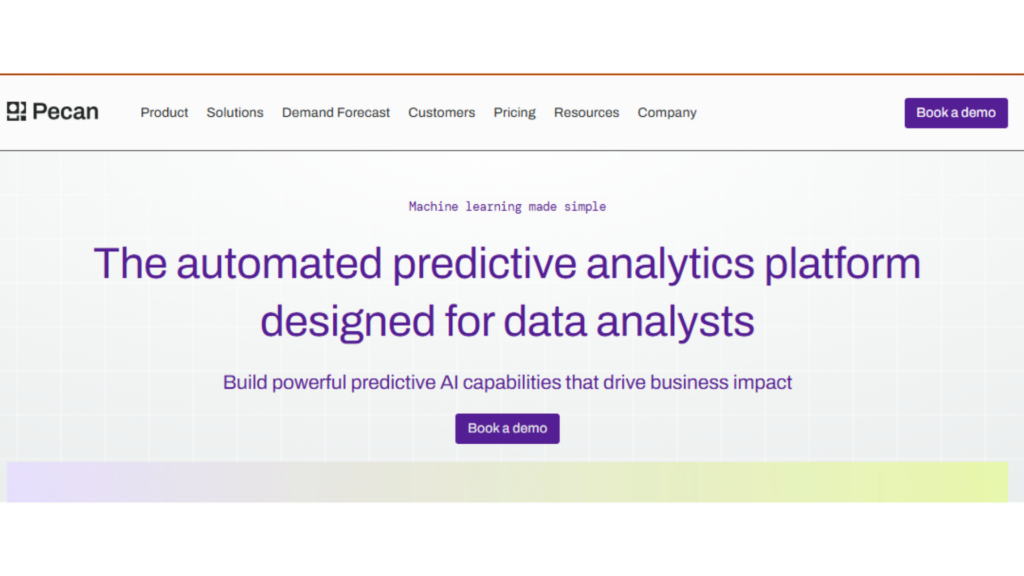
The introduction of Predictive GenAI takes this further by combining generative AI with predictive modelling, helping companies produce accurate forecasts with greater ease.
This review covers Pecan AI’s features, ease of use, and how businesses can integrate it to strengthen data-driven decision-making. By the end, readers will have a clear understanding of how this tool supports predictive analytics without requiring an extensive technical background.
What is Pecan AI?
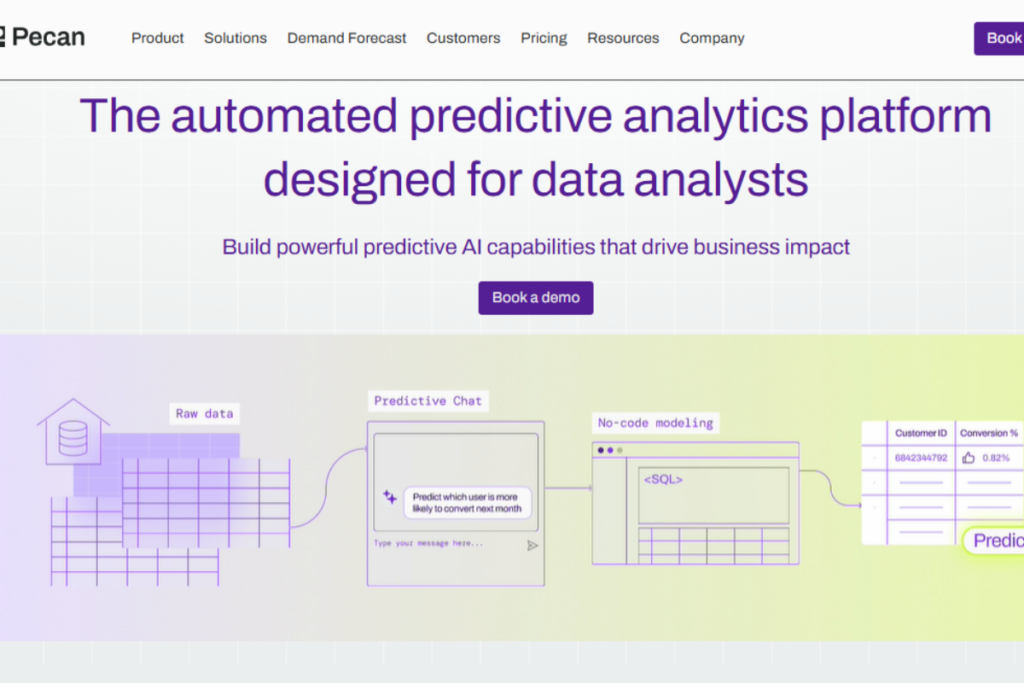
Pecan AI is a robust predictive analytics platform that helps businesses apply machine learning without requiring extensive technical knowledge.
It automates complex processes, making it easier for teams to forecast outcomes based on their existing data. Data analysts can build predictive models without needing expertise in programming or statistical modelling.
Core Functionality and Purpose
Pecan AI simplifies machine learning by providing a structured process that allows users to connect their data sources and generate predictive insights.
The platform handles tasks such as data preparation, feature selection, and model training, reducing the time and effort typically needed to develop accurate forecasts.
Analysts can focus on understanding the results and applying them to business decisions rather than managing technical processes.
Who Uses Pecan AI?
The platform serves businesses across various industries, including retail, finance, marketing, and supply chain management. It is designed for companies of all sizes that rely on data to make strategic decisions.
Teams working in data analysis, business intelligence, and operations benefit from its ability to automate predictive modelling without requiring dedicated data science teams.
Key Features and Benefits
- No Coding Required: Analysts can create machine learning models using SQL, making advanced predictive analytics more accessible.
- Fast Implementation: Users can build their first predictive model in less than a day, streamlining the adoption process.
- Seamless Data Integration: The platform connects with various data sources, allowing businesses to work with the information they already have.
- Scalability: Supports multiple use cases, such as demand forecasting, customer retention analysis, and marketing optimization, making it applicable across different business functions.
By providing these capabilities, Pecan AI helps organizations use their data more effectively to anticipate trends, optimize operations, and improve decision-making.
Pecan AI Pros and Cons
Pecan AI helps businesses simplify predictive analytics by making machine learning more accessible to teams without specialized expertise. While it offers multiple benefits, there are some limitations to consider.
Pros
- No Coding Required – Users can create and apply machine learning models using SQL, making it practical for those without programming experience.
- Quick Model Deployment – Many users can build their first predictive model in less than a day, allowing faster decision-making.
- Automated Data Processing – Handles tasks such as cleaning and feature selection, reducing manual work.
- Easy Integration – Connects with various databases and business intelligence tools, streamlining data access.
- Scalable for Different Industries – Supports multiple sectors, including marketing, retail, finance, and supply chain management.
Cons
- Pricing Not Publicly Available – Requires businesses to contact sales teams for cost details.
- Limited Customization for Experts – Data scientists looking for advanced tuning options may find fewer settings available.
- Structured Data Dependence – Works best with well-organized datasets, which may require adjustments before use.
These factors help businesses evaluate if Pecan AI aligns with their predictive analytics needs.
Pecan AI Expert Opinion & Deep Dive
Building on the previous sections, it’s useful to assess how Pecan AI compares to similar tools. Understanding its strengths and limitations helps businesses determine if it meets their predictive analytics needs.
Standout Features
Pecan AI provides a low-code platform on which users can create predictive models using SQL. This approach makes machine learning more accessible to analysts and business teams without a programming background.
The platform automates data preparation, model building, and deployment, allowing companies to implement predictive analytics more efficiently.
Comparison with Other Tools
Compared to platforms like Alteryx and DataRobot, Pecan AI takes a more user-friendly approach. Alteryx offers strong data processing and analytics but often requires a learning curve.
DataRobot automates machine learning but tends to be more technical. Pecan AI simplifies the process by focusing on ease of use, making it a practical choice for teams that need quick predictions without extensive training.
Best Fit for Users
Pecan AI works well for businesses that want to integrate predictive models into decision-making without hiring specialized data scientists.
A mid-sized retail company, for example, could use Pecan AI to forecast inventory needs based on sales patterns. This would help prevent overstocking or shortages, improving supply chain efficiency.
Limitations
While Pecan AI simplifies predictive modelling, it may not offer the customization some advanced users need. Data scientists who prefer full control over model development may find fewer options for fine-tuning.
The platform is also best suited for structured data, which means businesses with unstructured or highly complex datasets may need additional preprocessing. Pecan AI offers a practical solution for companies looking to apply machine learning without investing in a dedicated data science team.
The platform makes predictive analytics more accessible while automating key processes. Businesses that need deep customization or work with complex datasets may want to explore alternatives, but for teams focused on efficiency and ease of use, Pecan AI presents a strong option.
Pecan AI Key Features
Following the previous discussion, this section highlights Pecan AI’s main capabilities and explains how they help businesses effectively apply predictive analytics.
1. Predictive GenAI & Chat
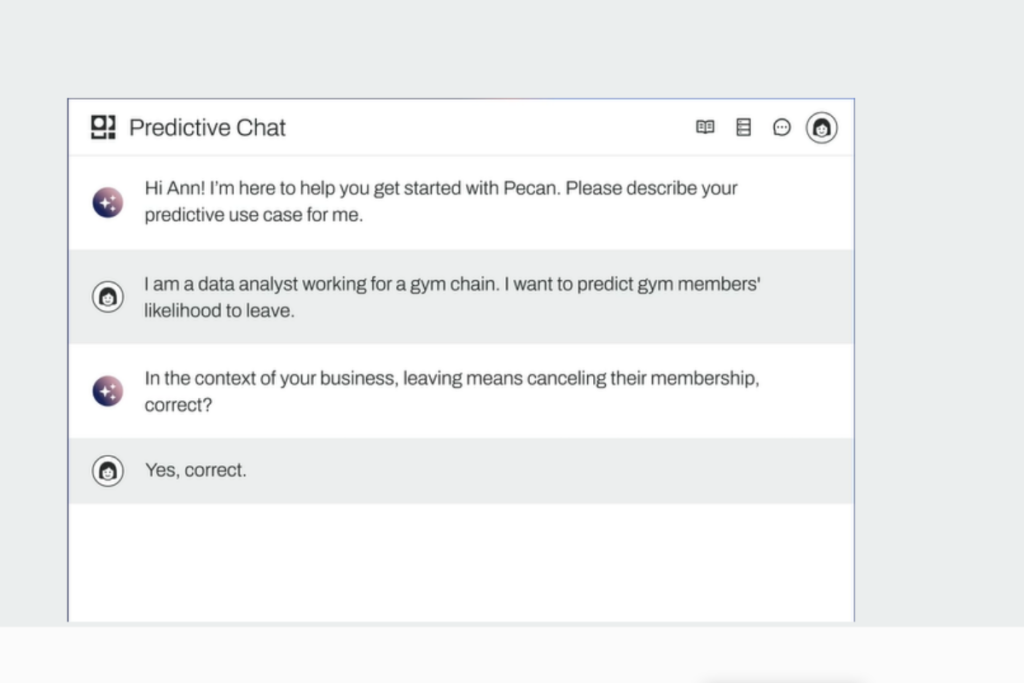
Pecan AI includes Predictive GenAI, which combines generative AI with predictive modelling. This feature allows users to describe their goals in a conversational format, simplifying the process of creating predictive models.
By handling data preparation and feature selection automatically, Predictive GenAI makes it easier to generate accurate forecasts without requiring extensive technical knowledge.
2. Automated Data Processing
The platform reduces the time and effort needed for data cleaning, transformation, and feature engineering. These tasks are typically labour-intensive, but Pecan AI streamlines them, allowing users to focus on interpreting results and making decisions based on insights.
3. Seamless Data Integration

Pecan AI connects with multiple data sources, including cloud-based databases and business intelligence platforms. This ensures that businesses can work with existing datasets without disrupting their workflows.
The platform’s ability to integrate smoothly with different systems allows for a more efficient approach to predictive modelling.
4. User-Friendly Interface
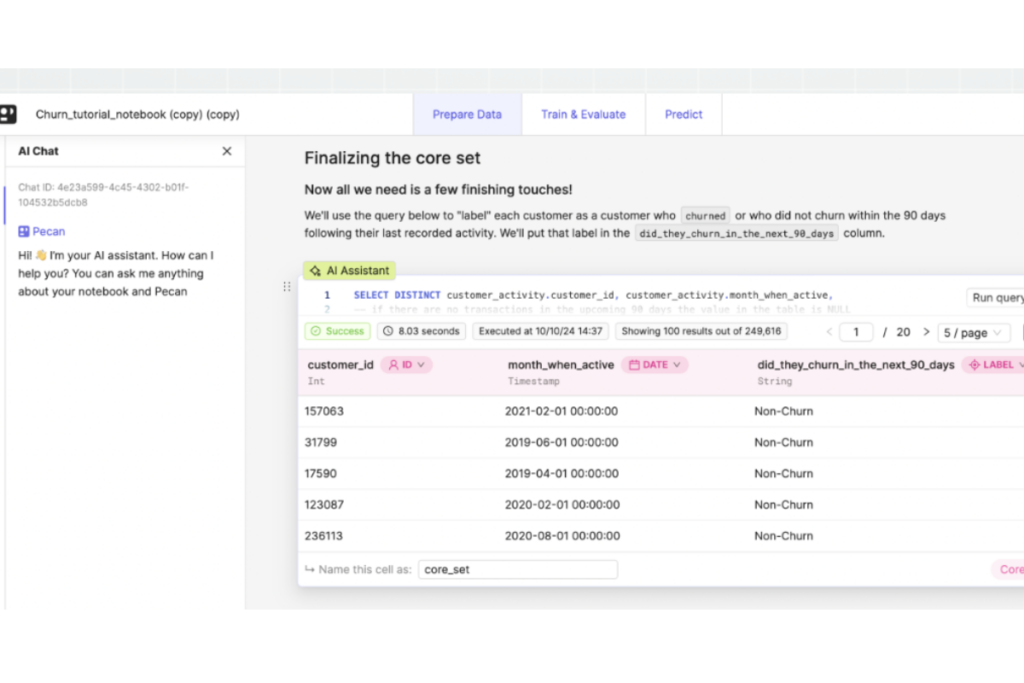
The design of Pecan AI makes predictive modelling accessible to analysts and business teams without advanced technical skills. Features like the Predictive Notebook guide users through the process, making it possible to develop and deploy models with minimal training.
Pecan AI provides businesses with a structured approach to predictive analytics, helping them use data effectively for decision-making across different functions.
Pecan AI Pricing
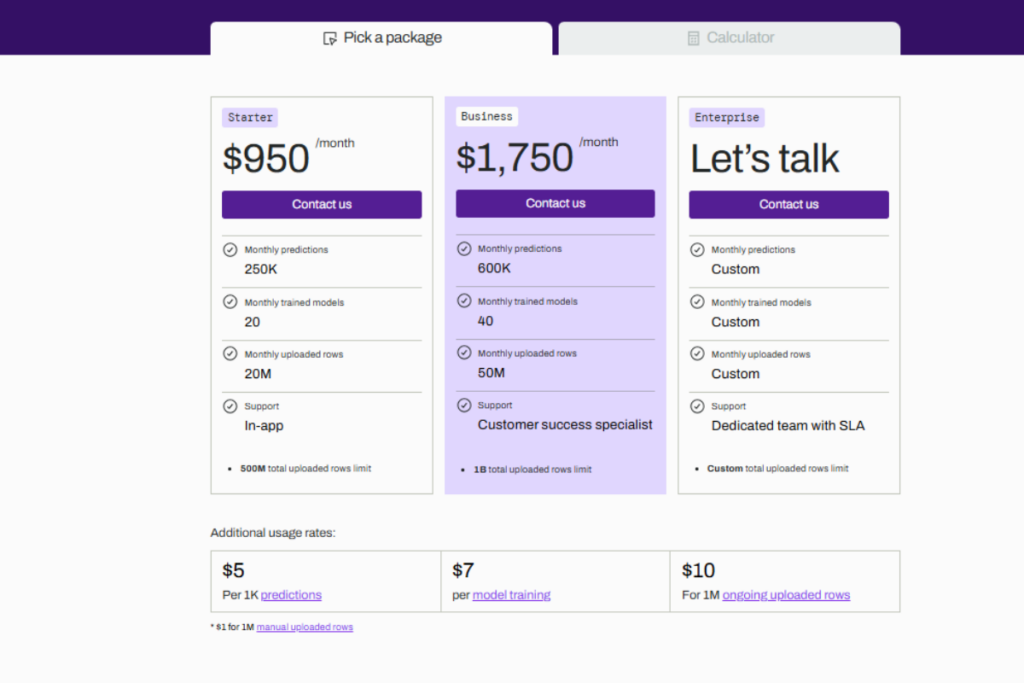
Pecan AI provides structured pricing based on data volume, predictions, and model training needs. Businesses can choose from three main plans—Starter, Business, and Enterprise—depending on their data processing requirements.
Costs increase based on the number of predictions, trained models, and uploaded rows. Additional usage charges apply when usage exceeds plan limits.
Pecan AI Pricing Plans
| Plan | Pricing | Features |
|---|---|---|
| Starter | $950 / month | 250K monthly predictions 20 monthly trained models 20M monthly uploaded rows In-app support 500M total uploaded rows limit |
| Business | $1,750 / month | 600K monthly predictions 40 monthly trained models 50M monthly uploaded rows Customer success specialist support 1B total uploaded rows limit |
| Enterprise | Contact for pricing | Custom monthly predictions Custom monthly trained models Custom monthly uploaded rows Dedicated support team with SLA Custom total uploaded rows limit |
Additional Usage Fees
- $5 per 1,000 extra predictions
- $7 per additional model training
- $10 for every 1 million ongoing uploaded rows
The pricing model is structured for flexibility, making it suitable for businesses that process varying amounts of data.
The Starter plan is a good fit for teams that are beginning with predictive analytics, while the Business and Enterprise plans support larger-scale needs. Since there is no free option, companies should assess their data usage before selecting a plan.
Pecan AI Use Cases
Pecan AI supports organizations that rely on predictive analytics for strategic decision-making. It works best for industries that handle structured data and need insights to optimize operations.
1. E-commerce and Retail
Retailers and online marketplaces use Pecan AI to predict customer purchasing behavior, optimize inventory levels, and reduce churn. By analyzing past sales patterns, businesses can make data-driven stock decisions, preventing shortages or excess inventory.
2. Marketing and Customer Insights
Marketing teams apply Pecan AI for predictive lead scoring, customer segmentation, and campaign optimization. By analyzing engagement trends, businesses can allocate resources efficiently, improving conversion rates and customer retention.
3. Financial Services and Risk Management
Banks, insurance companies, and financial firms use Pecan AI for fraud detection, credit risk evaluation, and customer retention. Predictive models help identify potential risks and detect fraudulent transactions before they escalate.
4. Supply Chain and Logistics
Companies working in logistics and supply chain management use Pecan AI to forecast demand, optimize delivery routes, and assess supplier performance. Predictive models help prevent delays and improve operational efficiency.
5. Subscription-Based Businesses
SaaS providers and businesses with subscription models use Pecan AI to forecast customer churn and lifetime value. By identifying customers at risk of cancellation, businesses can take proactive measures.
Pecan AI adapts to multiple industries, making it a practical choice for companies looking to automate predictive analytics without building machine learning models from scratch.
Pecan AI Support
Following the discussion of features and pricing, this section examines Pecan AI’s performance in terms of usability and customer support.
User Experience and Onboarding
Pecan AI has an intuitive interface, making it practical for data analysts and business users. The platform follows a low-code approach, allowing users to develop predictive models using SQL without requiring expertise in programming or data science.
The onboarding process is structured to help new users get started quickly. An AI assistant guides users through the steps needed to build and deploy models, simplifying the workflow.
Many users report being able to create their first predictive model within a day, indicating a short learning period compared to traditional machine learning platforms.
Customer Support and Resources
Pecan AI provides different levels of support depending on the pricing plan:
- In-App Support – Available for Starter plan users, assisting directly within the platform.
- Customer Success Specialist – Business plan users receive guidance from a dedicated specialist.
- Dedicated Support Team with SLA – Enterprise clients receive priority support with guaranteed response times.
The platform includes a knowledge base with documentation, step-by-step guides, and troubleshooting articles. These resources help users resolve common issues without needing direct assistance.
Feedback from users indicates that while the platform is accessible, some advanced features may require time to grasp fully. The support team is noted for being responsive and helping users address any challenges.
Pecan AI is structured to accommodate both new and experienced users, providing a balance of automation and support to help businesses integrate predictive analytics into their operations efficiently.
Pecan AI Integrations
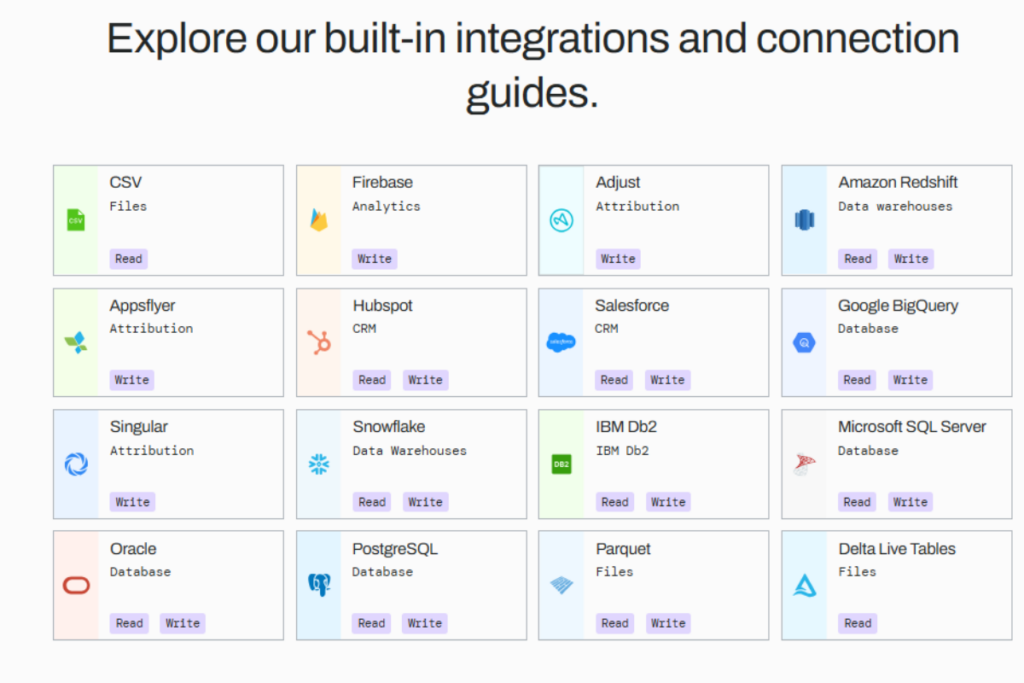
Expanding on the previous section, Pecan AI supports multiple integrations that allow businesses to connect their existing data sources and streamline predictive analytics.
Data Source Integrations
Pecan AI is compatible with widely used data storage platforms, including:
- Amazon Redshift
- Snowflake
- Google BigQuery
- Oracle
- Microsoft SQL Server
These integrations provide users with direct access to their stored data, making it easier to build predictive models without manual data transfers.
Marketing Attribution Tools
The platform works with marketing analytics solutions such as Adjust, Appsflyer, and Singular. These connections allow businesses to analyze customer interactions, measure campaign effectiveness, and optimize targeting based on predictive insights.
Business System Integration
Pecan AI can be linked with CRM platforms, marketing automation tools, and enterprise applications. This integration simplifies the process of embedding predictive models into existing business workflows, helping teams apply data-driven insights more effectively.
Device and Operating System Compatibility
Pecan AI operates as a cloud-based service, making it accessible through web browsers on different devices and operating systems. This setup removes the need for software installations, ensuring a seamless experience across desktops, laptops, and mobile devices.
Pecan AI’s ability to integrate with primary data sources, marketing tools, and business platforms makes it a strong choice for companies.
Pecan AI FAQs
Following the discussion on integrations, this section answers common questions about Pecan AI’s pricing, features, support, and suitability.
1. What pricing plans are available for Pecan AI?
Pecan AI offers three plans: Starter ($950/month), Business ($1,750/month), and Enterprise (custom pricing). Each plan includes different limits on predictions, model training, and uploaded data.
2. Is there a free trial for Pecan AI?
Pecan AI does not currently offer a free trial. Businesses interested in the platform can request a demo or speak with the sales team for more details.
3. What data sources can Pecan AI connect with?
Pecan AI integrates with Amazon Redshift, Snowflake, Google BigQuery, Oracle, and Microsoft SQL Server. It also supports marketing attribution tools such as Adjust and Appsflyer.
4. What industries benefit from using Pecan AI?
Retail, finance, marketing, and supply chain management frequently use Pecan AI for forecasting, customer retention analysis, and risk assessment.
5. What kind of customer support does Pecan AI provide?
Support depends on the plan. Starter users receive in-app assistance, Business plan subscribers have access to a customer success specialist, and Enterprise clients get a dedicated support team with SLA coverage.
6. Is Pecan AI suitable for businesses without data scientists?
Yes, Pecan AI is designed for data analysts and business teams. The low-code interface allows users to create predictive models using SQL without requiring advanced knowledge of machine learning.
Pecan AI Alternatives
Pecan AI provides an automated approach to predictive analytics, simplifying data preparation and model deployment. Several other platforms offer similar capabilities, each with distinct features, pricing, and use cases. The table below highlights key differences.
| Alternative | Features | Pricing | Best Fit |
|---|---|---|---|
| Notus AI | – Predictive modeling for finance and risk management – AI-driven market forecasting – Customizable automation tools | Custom pricing | Financial institutions and businesses needing market risk analysis |
| Vanna AI | – Natural language interface for data queries – AI-powered insights – No-code analytics | Custom pricing | Organizations looking for conversational AI to interact with data |
| Dotdata | – Automated feature engineering – Full AI lifecycle support – Integration with enterprise data platforms | Contact for pricing | Businesses that require full automation in predictive modeling |
| Athena Intelligence | – AI-powered decision-making for agriculture and supply chains – Predictive analytics for environmental data – Geospatial data integration | Custom pricing | Agriculture, food supply, and logistics sectors |
| LevelFields AI | – Predictive financial analytics – AI-generated investment signals – Market event tracking | Subscription-based | Investors and traders seeking AI-driven financial insights |
| Fabi.ai | – Customer behavior predictions – AI-driven personalization – Retail and e-commerce focus | Contact for pricing | Retailers and online businesses optimizing customer engagement |
| Breadcrumb.ai | – AI-powered fraud detection – Pattern recognition in transactions – Compliance and security monitoring | Custom pricing | Banks, insurance companies, and fraud prevention teams |
| Zoë | – Conversational AI for data analytics – Custom workflows for decision-making – Integration with business tools | Subscription-based | Teams that require a chatbot-style interface for data insights |
| Wren AI | – Automated AI pipeline for machine learning – Predictive insights for business growth – No-code setup | Contact for pricing | Businesses that need a plug-and-play AI solution |
| BRYTER Extract | – AI-driven document processing – Text analytics and automation – Legal and compliance focus | Custom pricing | Legal firms and enterprises managing large document workflows |
Each platform in this list provides solutions that address different business needs. Dotdata and Wren AI focus on fully automated AI workflows, whereas Vanna AI and Zoë emphasize conversational analytics.
LevelFields AI and Notus AI cater to the financial sectors, while Fabi.ai and Breadcrumb.ai serve retail and fraud detection use cases.
Athena Intelligence is suited for agriculture and environmental data, and BRYTER Extract specializes in legal and compliance document processing. Choosing the right tool depends on the industry, business objectives, and level of AI automation required.
Summary of Pecan AI
Pecan AI was founded in 2018 and is based in Ramat Gan, Israel. The company was started by Zohar Bronfman (CEO) and Noam Brezis (CTO) with the goal of making predictive analytics accessible to businesses without requiring deep technical expertise.
Pecan has raised $116 million from investors such as Insight Partners, GV (formerly Google Ventures), S-Capital, GGV Capital, Dell Technologies Capital, Mindset Ventures, and Vintage Investment Partners.
The platform processes over 14 trillion records each day, supporting companies across multiple industries. Pecan’s Predictive GenAI automates data preparation and model building, allowing data analysts and business teams to create predictive models without writing complex code.
The company has expanded its presence to 15 countries and reported a 150% increase in annual recurring revenue along with a 121% rise in customer count in the first half of 2022. Pecan continues to focus on simplifying machine learning for businesses through automation and AI-driven insights.
Conclusion
Pecan AI simplifies predictive analytics by allowing data analysts and business teams to create machine learning models without advanced programming knowledge. The platform stands out for its low-code model-building, automated data processing, and seamless integration with popular data sources.
Businesses in retail, finance, marketing, and supply chain management can use it to improve forecasting, customer retention, and risk analysis. At the same time, some areas may require consideration.
Data scientists looking for advanced customization might find fewer options for manual model tuning. Pricing details are not publicly listed, requiring businesses to contact the company for more information.
For teams looking for a streamlined predictive analytics solution, Pecan AI is worth exploring. We recommend scheduling a demo to determine how it fits specific business needs. If you’ve worked with Pecan AI, share your thoughts or reach out to discuss how predictive analytics is shaping industries today.